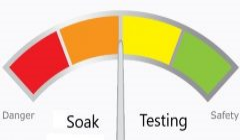Performance testing, a non-functional testing technique performed to determine the system parameters in terms of responsiveness and stability under various workload. Performance testing measures the quality attributes of the system, such as scalability, reliability and resource usage
Types of Performance Testing

Load Testing
It is the simplest form of testing conducted to understand the behaviour of the system under a specific load. Load testing will result in measuring important business critical transactions and load on the database, application server, etc., are also monitored.

Stress Testing
It is performed to find the upper limit capacity of the system and also to determine how the system performs if the current load goes well above the expected maximum.

Soak Testing
Soak Testing also known as endurance testing, is performed to determine the system parameters under continuous expected load. During soak tests the parameters such as memory utilization is monitored to detect memory leaks or other performance issues. The main aim is to discover the system’s performance under sustained use.

Spike Testing
Spike testing is performed by increasing the number of users suddenly by a very large amount and measuring the performance of the system. The main aim is to determine whether the system will be able to sustain the workload.
Our Approach to Performance Testing
Comprehensive end-user performance requirements based on service level agreements
Understanding of infrastructure associated with application
Test planning and resource requirement analysis, use case analysis and performance scenario definition
Test data creation and test environment setup with consideration of network performance
Automation of performance test scenarios using tools
Test monitor setup, test execution and results analysis
Assistance in tuning the performance parameters for webservers, appservers, OS and database server

